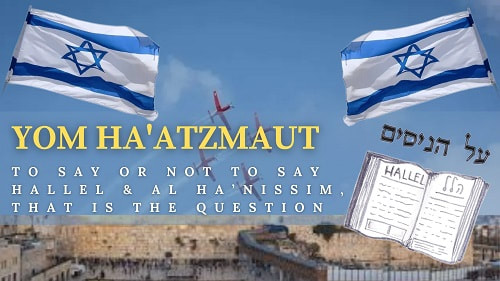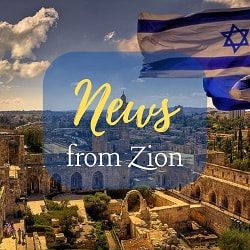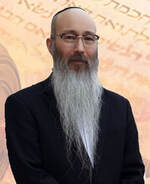|
By: HaRav Menashe Sasson Reporting from Jerusalem, Israel Published in the U.S.A. There’s an old joke about a Jewish news reporter who interviewed an American politician:
Unfortunately, there are many Jews who live in the United States who, without giving it a second thought, celebrate the Fourth of July, America’s Independence Day, but who would never even consider celebrating Yom Ha’Atzmaut. More troubling is the subset of Jews who reside in the United States who are religious, but, like their non-religious brethren, also do not celebrate Yom Ha’Atzmaut. In the Amidah (תפלת העמידה), the thrice-daily prayer which is recited by religious Jews the world over, we say:
Ever since 5 Iyyar 5708 (May 14, 1948), the date on which the modern-day State of Israel was founded, the Jewish nation, against all odds and for the first time in 2,000 years, raised a banner (flag) of Jewish sovereignty over Eretz Yisra’el (the Land of Israel) and began to gather its exiles from the four corners of the earth. The founding of the State of Israel was not just an historic event; it was, and continues to be, the fulfillment of HaShem’s promise to His people Yisra’el and an open miracle which we are privileged to experience in our time. Notwithstanding this open miracle, many religious Jews believe, or have been taught, that it is inappropriate on Yom Ha’Atzmaut to recite Hallel or add Al Ha’Nissim to their recitations of the Amidah (תפלת העמידה) and Grace After Meals (ברכת המזון). The Talmud provides guidance on when it is appropriate to recite Hallel:
T.B. Pesahim 117a. Several commentators hold that one should recite Hallel not only on festivals, but also on every appropriate occasion, for trouble to not come upon the Jewish people, and when the Jewish people are redeemed. One halakhic decisor even holds that it is a Torah obligation to recite Hallel in commemoration of such occasions. Hatam Sofer, O.H. 161, 191, 208. The return of Jewish sovereignty to at least a portion of Eretz Yisra’el and the beginning of the ingathering of the exiles, events which we request in prayer three times a day, certainly qualifies as an “appropriate occasion” to recite Hallel and, arguably (at least to some), also constitutes the beginning of the Redemption. Thus, it is clearly appropriate for one to recite Hallel on Yom Ha’Atzmaut. Whether to recite Al Ha’Nissim (על הניסים), at least in the context of the Amidah (תפלת העמידה), is a bit more nuanced. It is prohibited to insert personal requests in the first and last three (3) blessings of the Amidah (תפלת העמידה), notwithstanding that insertion of personal requests is allowed (and, indeed, even encouraged) in the “middle” blessings of that prayer. However, because Al Ha’Nissim (על הניסים) is in the nature of praise, rather than in the nature of a personal request, the prohibition of inserting personal requests in the blessing of Modim (מודים), the second of the last three blessings of the Amidah (תפלת העמידה), does not apply to Al Ha’Nissim (על הניסים). Indeed, at least one halakhic decisor affirmatively holds that there is no halakhic impediment to inserting words of praise in the blessing of Modim (מודים). Tur, Ohr HaHayim 582; M.T., Hilhot Tefilah 6:3. Furthermore, just as one may insert Al Ha’Nissim (על הניסים) into his recitation of the Amidah (תפלת העמידה), so too, he may insert this same addition to his recitation of Grace After Meals (ברכת המזון). One final issue on the appropriateness of reciting Hallel and Al Ha’Nissim (על הניסים) on Yom Ha’Atzmaut is the objection some might have regarding whether the government of the State of Israel is on a level that would make it appropriate for us to insert these additions into our Yom Ha’Atzmaut prayers. Although it is true that there is more than ample room for improvement in the government of the State of Israel, the fact remains that, after 2,000 years, HaShem has, and continues, to answer our prayers to “[r]aise a banner [as a sign] to gather our exiles, and gather us together from the four corners of the earth into our land.” Regardless of the substantial failings of Israeli government, as well as Israeli (and in some cases, non-Jewish) politicians, let us not be blind to the miracles of Yom Ha’Atzmaut. חג עצמאות שמח Happy Independence Day! Copyright © The Israel Foundation. All Rights Reserved.
0 Comments
Your comment will be posted after it is approved.
Leave a Reply. |
THE ISRAEL FOUNDATION





